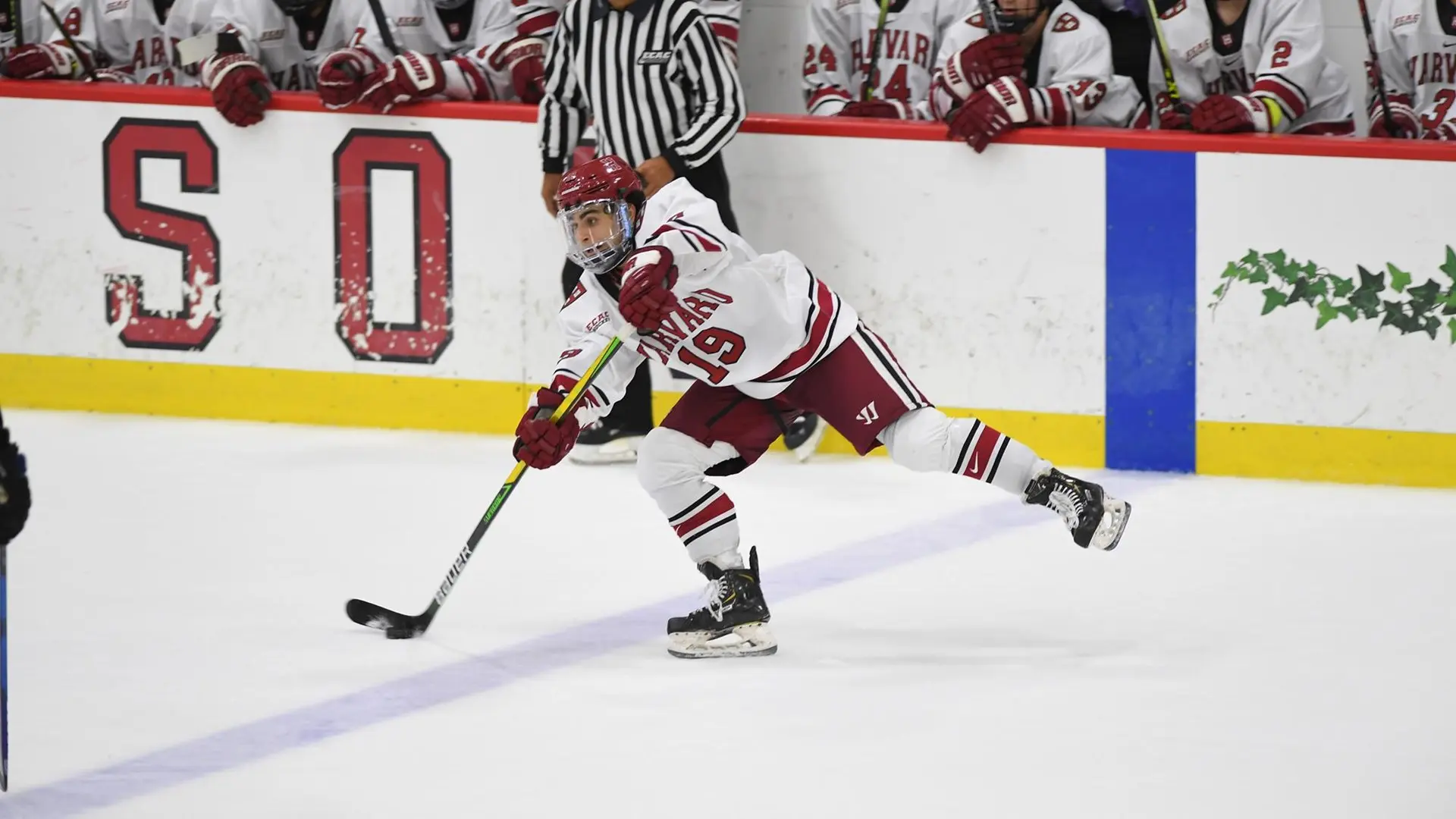Nation Sites
The Nation Network
FlamesNation has no direct affiliation to the Calgary Flames, Calgary Sports and Entertainment, NHL, or NHLPA
What to expect from a Matt Coronato contract with the Calgary Flames

Photo credit: Gil Talbot/Harvard Crimson
Whenever Harvard’s season ends, the Calgary Flames intend on signing prospect Matt Coronato. But bearing that desire in mind, what can we reasonably expect to see in Coronato’s entry-level deal?
In anticipation of a deal potentially happening as early as Friday night, let’s dive into the mechanics.
Contract length
Coronato is 20 and turns 21 in November. Based on how the CBA defines age for entry-level deals, he’s signing in his 21-year-old year. Whether he’s 20 or 21, he’d be signing a three year entry-level deal.
Because Coronato would be signing after Mar. 1, he would have the option of signing an ELC that wouldn’t begin until 2023-24 (and make him a restricted free agent following the 2025-26 season). However, the thought process is that Coronato wants to play NHL games this season, so he’ll likely sign an ELC that begins immediately and expire after the 2024-25 season.
Coronato doesn’t need to play in any games for his ELC to start running, he just needs to sign a deal that begins this season. If he signs, reports and never plays, the first year will be burned.
The quirk with that is that when his ELC expires, he would only have two seasons of service under RFA guidelines, so he would become what’s known as a “10.2(c)” free agent – he’d be an RFA, but wouldn’t be eligible for offer sheets or salary arbitration. (The same thing happened to Johnny Gaudreau after his ELC.)
Salary
By virtue of his draft year, Coronato can receive a maximum of $925,000 in salary – which is typically split $92,500 of signing bonus and $832,500 of salary – and because he’s a first-rounder and a high-end prospect, he’ll probably get that. The salary he receives will be pro-rated over the proportion of the season that’s left, but his cap hit will be $925,000.
Performance bonuses
Up until this point, everything that Coronato will be offered is pretty standard – the ELC term is capped by the CBA, as is his maximum ELC salary. But performance bonuses are where the Flames can actually negotiate a bit.
Generally-speaking, potential performance bonuses included in ELCs for first-round picks are scaled depending on when a player was selected in the first round. First overall picks tend to get the maximum amount of potential bonuses – $2.85 million per season, per the CBA – split between a maximum of $850,000 in “A” bonuses paid by teams for hitting statistical benchmarks and a maximum of $2 million in “B” bonuses paid by either the league or the team for winning trophies or being a league statistical leader.
Historically, players drafted around where Coronato was (13th overall) have gotten around $500,000 per season in potential performance bonuses (all comprised of potential “A” bonuses). Here are a few recently-signed forwards from recent drafts:
- 2021 12th overall pick Cole Sillinger got an average of $708,333 per season from Columbus
- 2018 13th overall pick Ty Dellandrea got an average of $537,500 per season from Dallas
- 2021 14th overall pick Isak Rosen got an average of $525,000 per season from Buffalo
- 2020 14th overall pick Dylan Holloway got an average of $516,667 per season from Edmonton
- 2020 13th overall pick Seth Jarvis got an average of $500,000 per season from Carolina
- 2018 14th overall pick Joel Farabee got an average of $500,000 per season from Philadelphia
- 2019 12th overall pick Matt Boldy got an average of $444,167 per season from Minnesota
- 2019 15th overall pick Cole Caufield got an average of $427,500 per season from Montreal
The difference between prospects who get a bunch of bonuses and those that don’t is leverage. Gaudreau received an average of $925,000 of potential bonuses in his ELC because he was the top player in college hockey at the time of his signing. He had leverage, as the Flames really didn’t want him to go back for his season year at Boston College.
Signing a player to a level of potential bonuses above what a similar draft pick would usually get can set a precedent, which is why teams tend to stick to the general guidelines and only stray when there are unique circumstances – a unicorn of a fourth-round pick like Gaudreau, for example.
From a pure market comparable situation, Coronato should be receiving about $500,000 per season in potential bonuses. But the Flames have the ability to negotiate when it comes to those bonuses, and if it comes down to it, they might nudge Coronato’s potential bonuses upward in an effort to get him to put pen to paper.
Harvard plays Ohio State on Friday in the NCAA’s regional playoffs, with the final in the Bridgeport, Connecticut bracket taking place on Sunday. Coronato could potentially sign an NHL contract as soon as his season ends.
